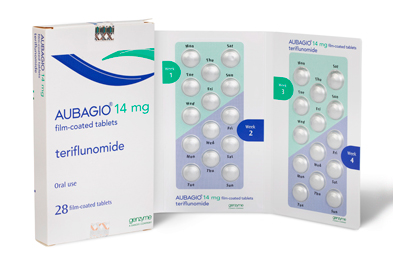Health Canada Non-Insured Health Benefits Program Approves AUBAGIO for Relapsing Remitting Multiple Sclerosis
Written by |

Genzyme Canada has announced that Health Canada has approved its 14 mg dose of AUBAGIO as an expedited exception benefit product through the federal health regulator’s Non-Insured Health Benefits (NIHB) Program for eligible First Nations people and Inuit as a first-line oral tablet therapy for relapsing remitting multiple sclerosis (RRMS).
AUBAGIO 14 mg once daily oral tablet was approved by Health Canada in November 2013 as monotherapy for treatment of patients with RRMS to reduce the frequency of clinical exacerbations and to delay the accumulation of physical disability.
The approval was based on efficacy data from two Phase III clinical trials TEMSO (TEriflunomide Multiple Sclerosis Oral) and TOWER (Teriflunomide Oral in people With relapsing remitting multiplE scleRosis). In the TEMSO trial, AUBAGIO 14 mg significantly reduced the annualized relapse rate (p=0.0005) and the time to disability progression (p=0.0279) at two years versus placebo in patients with RRMS. In the TOWER trial, AUBAGIO 14 mg significantly reduced the annualized relapse rate (p=0.0001) and the time to disability progression sustained for 12 weeks (p=0.0442) was statistically significantly reduced versus placebo in patients with RRMS.
According to Genzyme, AUBAGIO is an immunomodulator with anti-inflammatory properties. Although the exact mechanism of action for AUBAGIO is not fully understood, it may involve a reduction in the number of activated lymphocytes in the central nervous system (CNS). AUBAGIO is supported by one of the largest clinical programs of any MS therapy, with more than 5,000 trial participants in 36 countries. Some patients in extension trials have been treated for up to 10 years.
Described by the National Multiple Sclerosis Society, AUBAGIO, a pyrimidine synthesis inhibitor, is an oral compound that inhibits the function of specific immune cells that have been implicated in MS. It is related to leflunomide, a drug used to treat rheumatoid arthritis. Aubagio can inhibit a key enzyme required by white blood cells (lymphocytes) – which in turn reduces the proliferation of T and B immune cells that are active in MS and also inhibits the production of immune messenger chemicals by T cells.
“Aubagio with its combination of efficacy, safety, convenience and tolerability is an excellent first line choice for many patients with RRMS,” says Dr. Daniel Selchen, Chief, Neurology, and Consultant, MS Clinic, St. Michael’s Hospitalin Toronto, Ontario.
“The NIHB approval of AUBAGIO represents a step forward in the management of MS,” says Dr. Virginia  Devonshire, Clinical Assistant Professor Neurology, University of British Columbia, and Director, MS Clinic, University Hospital of Northern BC. “AUBAGIO is a safe and effective oral treatment choice for relapsing MS.”
Devonshire, Clinical Assistant Professor Neurology, University of British Columbia, and Director, MS Clinic, University Hospital of Northern BC. “AUBAGIO is a safe and effective oral treatment choice for relapsing MS.”
“We are pleased that Health Canada has been responsive in listing another disease-modifying therapy option for those with multiple sclerosis who are eligible for the Non-Insured Health Benefits (NIHB) for First Nations people and Inuit,” says, MS Society of Canada National Vice President of Talent, Programs and Services Sylvia Leonard. “This responsiveness means that Canadians with MS have greater access to treatments to manage the effects of their disease. For individuals with MS who are interested in exploring treatment options, we encourage them to consult with their healthcare team to find the course that is most appropriate for them.”
With 100,000 Canadians living with MS and three people newly diagnosed every day, Canada has one of the highest prevalence rates in the world. Most people with relapsing MS are diagnosed in their twenties and thirties, and MS is the most common neurological disease affecting young adults in Canada.
 “We applaud Health Canada for making AUBAGIO available to First Nations people and Inuit suffering from RRMS who meet appropriate criteria through the expedited exception process. With its once-a-day oral regimen, this will provide eligible patients an important alternative to injectable treatments,” said Peter Brenders, General Manager, Genzyme Canada.
“We applaud Health Canada for making AUBAGIO available to First Nations people and Inuit suffering from RRMS who meet appropriate criteria through the expedited exception process. With its once-a-day oral regimen, this will provide eligible patients an important alternative to injectable treatments,” said Peter Brenders, General Manager, Genzyme Canada.
As part of its commitment to those living with MS, Genzyme has developed the MS One to One program which offers comprehensive information services and ongoing education, as well as reimbursement navigation. Staffed by dedicated MS nurses and highly trained representatives, MS One to One provides support for individuals living with MS, their healthcare providers, family and loved ones.
Aubagio was approved by the U.S. Food and Drug Administration (FDA) in September, 2012 for patients with relapsing forms of multiple sclerosis. In one phase III study involving 1,088 people with relapsing MS (796 completed the trial), oral Aubagio reduced relapses compared with placebo over at least 108 weeks. Of two different doses tested during the TEMSO trial (7 mg and 14 mg), the higher dose also slowed progression of disability. Both doses also had a favorable effect on several MRI measures, including a smaller increase in total lesion volume and fewer new and actives lesions compared with placebo.
Two subsequent phase III trials have been published and the FDA approved inclusion of these trial results in the prescribing information for Aubagio in 2014. New information includes the ability of Aubagio to reduce the risk of relapse in people who have experienced a first clinical event suggestive of MS (clinically isolated syndrome).
• In the TOPIC Study, 618 people with clinically isolated syndrome (CIS — a first clinical episode suggestive of MS) were randomly assigned to receive 7 mg of Aubagio, 14 mg of Aubagio, or placebo once daily for 108 weeks. The primary outcome measure was time to relapse. A secondary outcome measure was time to relapse or the occurrence of new tissue damage on MRI scans, whichever occurred first. Compared to placebo, the risk of relapse was reduced by 42.6% among those taking the 14 mg dose, and by 37.2% among those taking the 7 mg dose. For the secondary endpoint, the risk of relapse or occurrence of new tissue damage was reduced by 34.9% in the 14-mg group and 31.4% in the 7-mg group compared with the placebo group.
• In the TOWER Study, 1,169 people with relapsing forms of MS were randomly assigned to receive 7 mg or 14 mg of Aubagio, or placebo, once daily for 48 weeks. The primary endpoint was whether Aubagio reduced the average number of relapses per year significantly more than placebo. Secondary endpoints included the time to disability progression confirmed for at least 12 weeks. Aubagio 14 mg reduced relapses by 36.3.% versus placebo and Aubagio 7 mg reduced relapses by 22.3% versus placebo. In the 14 mg group, the risk of sustained disability progression was reduced by 31.5%, while the lower dose did not significantly reduce progression.
AUBAGIO safety and prescribing information can be found at:
https://www.genzyme.ca/thera/docs/ca_en_pdf_ms_aubagiopi.pdf
For more information, visit:
https://www.genzyme.ca
Sources:
Genzyme Canada
The National Multiple Sclerosis Society
MS Society of Canada
Image Credits:
MS Society of Canada
St. Michael’s Hospital
Genzyme


